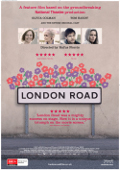
Directed by
Rufus Norris
91 minutes
Rated MA
Reviewed by
Chris Thompson

London Road
Synopsis: In 2006 the quiet rural town of Ipswich in Suffolk was shattered by the discovery of the bodies of five women. The residents of London Road had struggled for years with street prostitution and kerb-crawling. The film follows the community through these terrible events, the arrest of the suspect and the eventual healing process.
There are so many ways for this project not to have worked. For a start, it’s a movie made by a theatre company – and then, it’s a musical about a serial killer and his brutal murders of young prostitutes – and finally, all the dialogue and song lyrics are sourced verbatim from the words of the real residents of London Road and the real prostitutes who were interviewed in a three year period during the investigation and after the conviction of the murderer. What could possibly have gone wrong? Perhaps the more interesting question here is, how did they manage to get it so right?
The answers probably include the fact that the theatre company in question is the National Theatre which has been busy over the past several years carving out a niche in bringing the stage to the screen through their incredibly successful National Theatre Live programme (although I hasten to add that this is not just another ‘captured’ stage performance - it’s most definitely a cinematic experience) And to call it a musical is possibly a misnomer. It’s much more operatic than your average bit of music theatre in much the same way as a Sondheim production like :Sweeny Todd” stands squarely with a foot in both camps. Finally, the verbatim theatre style is, arguably, used better by the British than anywhere else in the world whether it’s embodying the words of real people in the form of claymation animals for Aardman’s popular TV series Creature Comforts, or the confronting and challenging verbatim and physical theatre work by a company like DV8 or, indeed, in this ground-breaking experiment in merging stagecraft with screencraft. It’s a triumph.
In making the transition from stage to screen, the National Theatre has retained the original cast (with the addition of headliners, Olivia Colman and Tom Hardy). They are an outstanding ensemble and Colman (who was a standout in the TV series Broadchurch) is terrific as Julie, the lynch-pin character who guides us through the story. Paul Thornley dominates many scenes as Dodge, an angry, frustrated everyman who, in many ways, personifies the transition that this damaged community goes through on its journey to recovery. Equally strong is Kate Fleetwood as the prostitute, Vicky, who gives a largely internalised performance that is moving and touching and carries us through to the final moments of the film. The inclusion of Tom Hardy is the oddity. He’s compelling and disturbing as Mark the taxi driver, but having such a big name for effectively one scene in an otherwise ensemble piece is a bit distracting. On the other hand, it’s great to see him balancing out his blockbuster work with smaller gems like this and last year’s tour de force in Locke.
The original creative team has also been reunited under director Rufus Norris, known for his many stage productions but also for his film work such as Broken (2012). The real craft here, though, has been in the work done by writer Alecky Blythe and composer Adam Cork who so deftly weave the verbatim text into a well-structured and beautifully ‘written’ work which enables the great performances we see in the ensemble. Their work is highlighted by the snippets of the real recordings that are played over the closing credits. They are joined by cinematographer, Danny Cohen, whose restless camera is constantly on the move in beautifully executed tracking shots that take us in and around and over the intersecting stories of the characters of London Road.
This is a modern day parable about the isolated lives we lead in our own streets and neighbourhoods and how it sometimes takes a terrible event to break through the barriers that prevent us from functioning as a healthy community. The film doesn’t shy away from this paradox, and in the end we’re left with the uncomfortable idea that, in murdering these prostitutes, the killer has done the London Road community a favour. As Julie puts it - But I'd love to shake his hand and say: 'Thank you very much for getting rid of them.'

Want more about this film?


Want something different?




